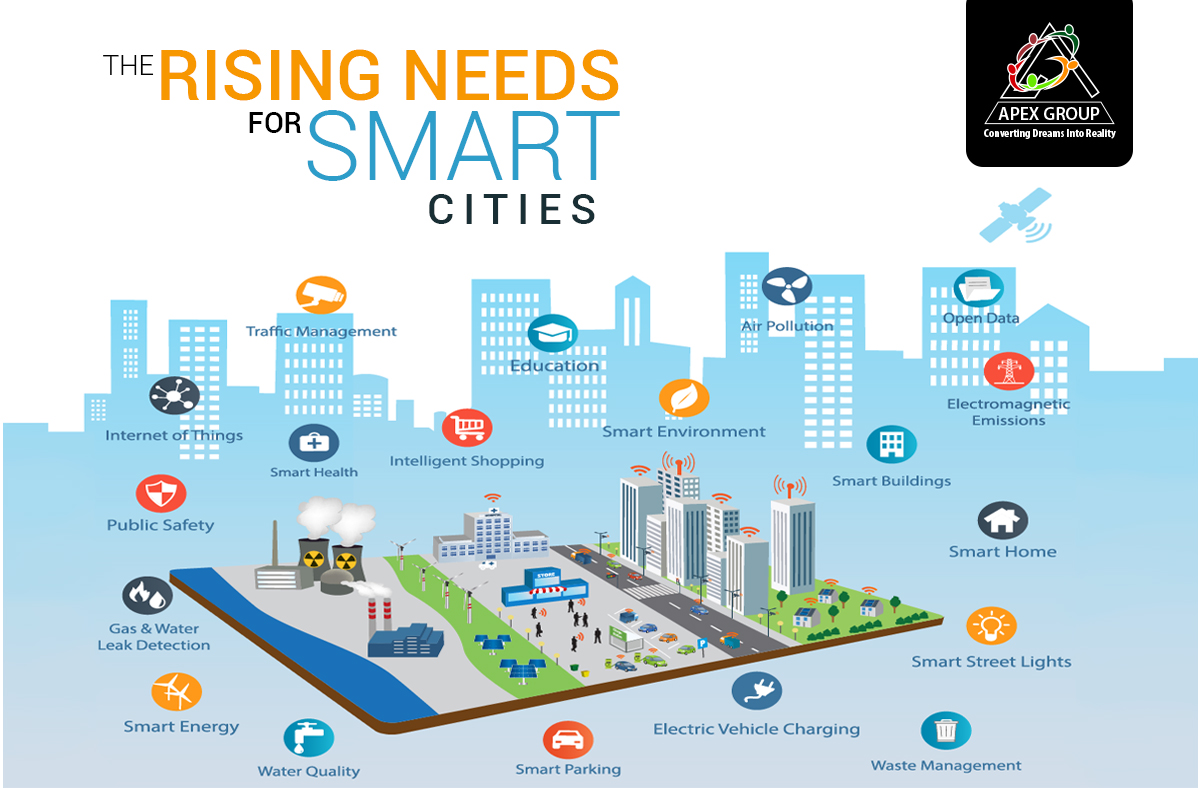


12 April, 2018
Why do we need Smart Cities


Technology
Let’s get one thing straight, Smart City is not about technology instead it’s about the transformation of the entire society by bringing changes to systems, infrastructure, and attitudes to ensure sustainability of the City. The need for smart cities is increasing more so in recent times because the rural population is exceeding the urban population in Pakistan and by 2050 almost 70% of the population will migrate towards urban areas. Currently, cities consume 75% of the world’s resources and energy and generate 80% of greenhouse gases hence the Government of Pakistan needs to focus on the growing demand for conservation of resources and energy.
What is a Smart City?
Smart City uses the latest information and modern communication Technologies in the integration of infrastructure so that the public services provided are more interactive, efficient and user-friendly. The word “Smart” implies intelligent investment in human and social capital and communication infrastructure that encourage sustainable economic development and better quality of life by smart management of natural resources. We need to protect our planet & stop the environmental damage for our future generations to come isn’t that so? Well, the solution to this issue is the establishment of Smart Cities through green technology and eco-friendly social practices. Smart Cities uplift the economy, society, environment, and welfare of a society and drive business models towards innovation & growth.
The Smart City Value
Smart City has countless benefits and the pros outweigh the cons. A smart City would contain a series of smart services and products that promote sustainable living in a healthy environment. The smart services include
Smart Health/Education
Smart Cities use artificial intelligence, Information & Communications Technology, machine learning & systems engineering to improve the healthcare & education services provided in a Smart City.
Smart Homes
Smart Homes have home automation systems whereby lighting, security, climate, entertainment systems, and appliances are controlled & monitored by Internet-connected devices. All devices that use electricity are put on your home network at your command so if you are worried whether kids at home are doing homework or watching TV or if you have switched off the microwave oven switch? You don’t have to worry because everything is now managed via command by voice, remote control, tablet or smartphone and the home reacts. How awesome is that?
Smart Energy
The natural resources will thin down to the bone by the year 2030 so the need to conserve energy reserves is more now than ever. Smart Homes promote smart energy by making it more efficient, reliable & green.
Smart Parking & Streetlights, Traffic Management, Air Pollution & Smart Environment
Smart streetlights are playing a crucial role in maintaining an efficient City environment with digital networks and embedded sensors they are able to detect traffic congestion and track available parking spaces. The smart streetlights can also control LED lights to turn off and on, bright or dim depending on the circumstances and offering cities a chance to maximize low-energy lighting benefits and also assure pedestrian safety. The traffic management would improve as 17% of Carbon dioxide emissions will reduce that will in turn filter the environment. Streetlights that have built-in scalable platforms can help reduce the crime rate by 10% and enhance public security.
Smart Buildings
Smart buildings use intelligent building management systems to automatically control the building’s operations including heating, air conditioning, security, elevator systems, and ventilation and so on.
Waste Management & Water Quality, Gas & Water Leak Detection
The framework of Smart City would do a lot of resource savings that include savings on 15% of water consumption by the irrigation of parks and gardens. Smart Metering would cause a 10% decrease in electrical energy consumption and 7% in personal water consumption. There are 25% savings in transport requirements depending on the type of waste.
Intelligent Shopping, Electric Vehicle Charging & Open Data
Electric vehicle charging, intelligent shopping, and Open Data are some of the unique traits in a Smart City. The availability of internet is at every nook & cranny, the trend for electric cars is booming with electric charging device station within the car. The concept of shopping is no more tedious and time-consuming because the shopping carts are equipped with radio frequency identification that will guide individual shoppers with the price, products, discounts etc. and at the end run up a total bill for the amount of shopping done. Therefore no more waiting in queues or asking around from retailers in a grocery store.
Smart City reduces public spending on the management of public services and increases efficiency as well as the quality of operations. Smart Cities promote business innovations and support in the decision-making process. Smart city helps to identify the needs of the city and the approach for new services and provide support. Smart Cities provide real-time information to increase the awareness and understanding among the public. Capital Smart City in Islamabad uses intelligent networks and platforms with millions of sensors, smart energy grid, measuring of environmental parameters and smart meetings.
Smart Cities provide a platform for the community to implement breakthrough technology, find new ideas & test theories, apply agile methodologies, and create positive changes in the neighborhood. Smart City is the new future of a “smart world”.
For more information on Smart City & Technology stay tuned to Apex Group. We will keep you informed about the changing real estate market trends.

.png)
.png)